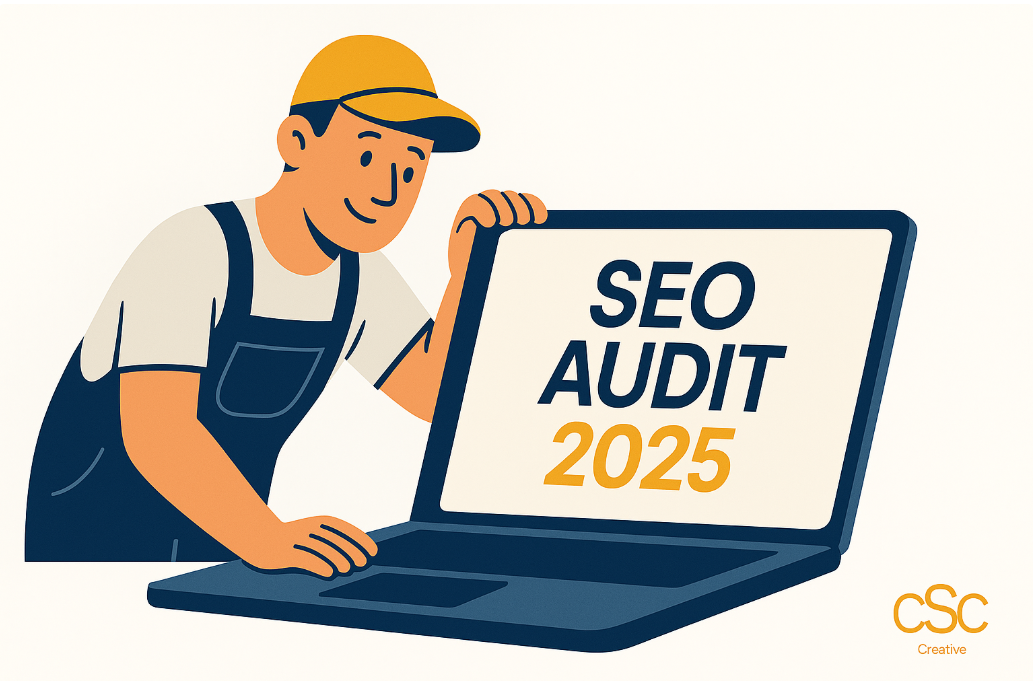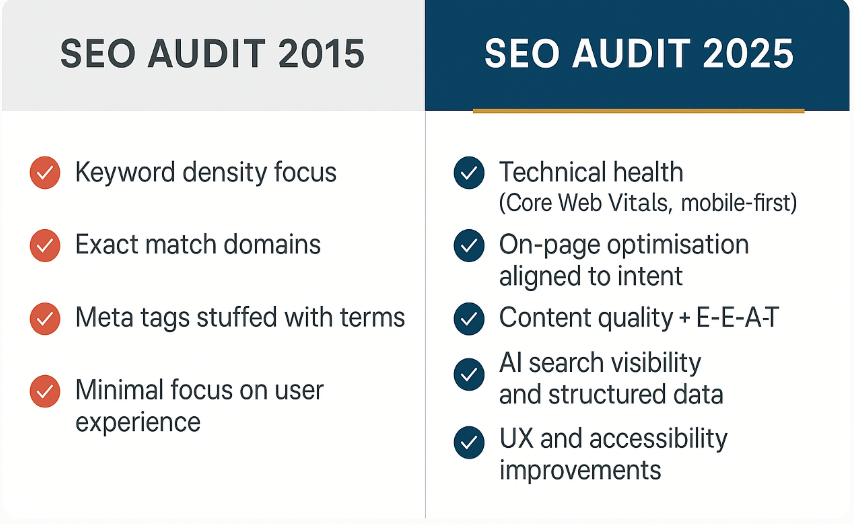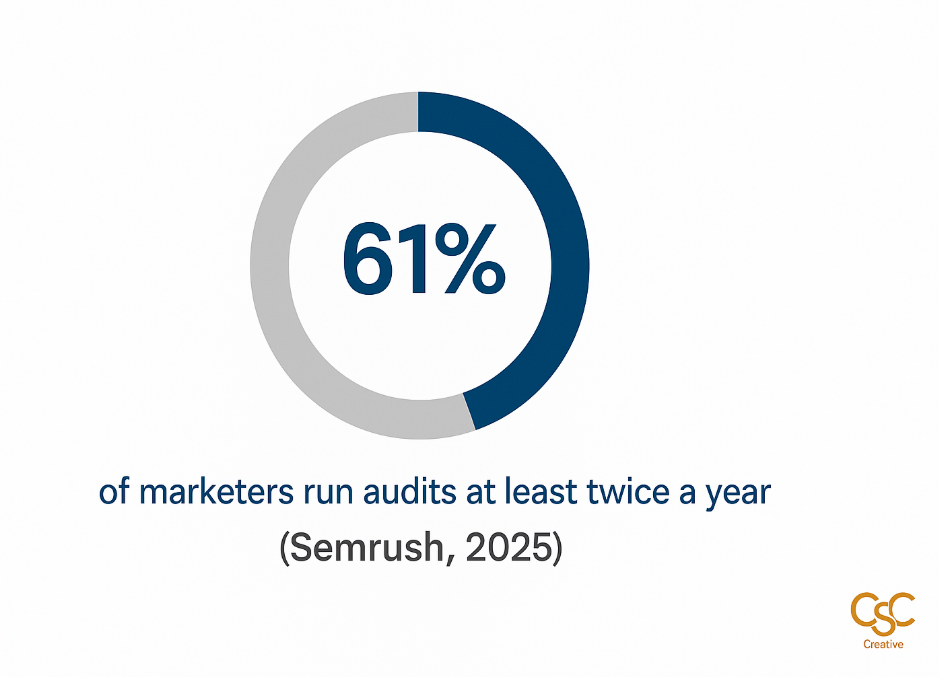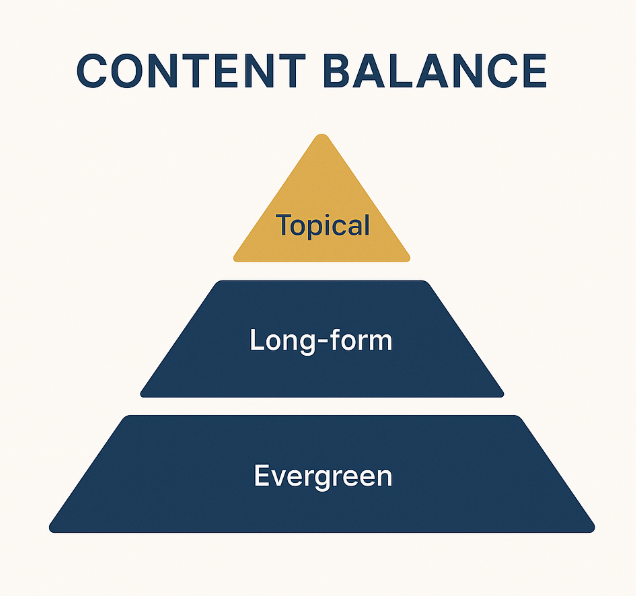How To Perform An SEO Audit in 2025
Here’s the thing about SEO: it doesn’t sit still. Yet loads of businesses still treat it like something you set up once and then forget about. If only it were that simple.
Search changes all the time. Google shifts the rules, AI’s rewriting how results appear, and what worked in 2021 could be dragging you down in 2025. Companies all over the world spend years wondering why web traffic dropped off a cliff, and the answer’s usually the same: no one’s looked under the bonnet in far too long.
That’s where an SEO audit comes in. Think of it as a service check for your site. It’s not glamorous, but it’s the difference between coasting in second gear and actually getting noticed online. Stick with me — I’ll show you the key steps to make it painless.
What Is an SEO Audit?
So what’s an SEO audit, really? The simplest way to put it is this: it’s a health check for your website. Not a one-off tick-the-box exercise, but a proper look under the hood to see what’s helping and what’s holding you back.
Why does it matter? Because the things you don’t see are usually the things that trip you up. Slow-loading pages, messy navigation, broken links — they all frustrate users and send the wrong signals to Google. In fact, studies show that 88% of online consumers are less likely to return after a bad experience. An audit helps you spot those barriers before they cost you business.
Here’s the shift: back in 2015, an audit was mostly about keywords. Were they stuffed in enough places to trick the algorithm? In 2025, it’s a different ballgame. We’re talking site health, user experience, accessibility, and even how your content gets picked up by AI-driven search results.
Look, keywords invariably still matter quite a lot , but they’re now only one piece of a much bigger puzzle.
Why Regular SEO Audits Matter
SEO isn’t a one-and-done job. Google changes constantly, and with the rollout of Search Generative Experience (SGE), what worked last year mightn’t work now. If you’re not checking in regularly, you’re flying blind.
The other reason? Your competitors aren’t standing still. They’re tweaking, improving, and running audits to make sure they’re ahead. If you don’t, you hand them the advantage. Simple as that.
I’ve seen it up close. A small café in Dublin had a decent website but left it untouched for years. Meanwhile, the café a few doors down kept on top of their SEO and suddenly owned the local searches. Both served good coffee. Only one showed up when people searched.
Regular audits keep you from being the café that disappears from the map.
Step 1: Check Technical Health
Technical health is the foundation of any SEO audit. If search engines can’t properly crawl and index your site, you’ll never rank — no matter how polished your content is.
Start with crawlability: make sure your XML sitemap is clean and submitted, and check that your robots.txt file isn’t blocking important pages. Run a crawl report to spot broken links or redirect loops that slow everything down. These are quick fixes that make a big difference.
Next, performance. Core Web Vitals — Largest Contentful Paint (LCP), Interaction to Next Paint (INP), and Cumulative Layout Shift (CLS) — are Google’s way of testing if your site loads quickly and behaves smoothly. In Ireland, more than 50% of traffic now comes from mobile, so slow, clunky pages are a deal-breaker.
Pro tip: Use Google PageSpeed Insights for a free snapshot of where your site stands. It’s often an eye-opener.
Once your technical base is solid, you can move onto content — because the fastest site in the world still needs substance.
Step 2: Review On-Page SEO
Once the technical health is sorted, it’s time to look at what people actually see: your on-page SEO. This covers the basics like titles, meta descriptions, and headers — the bits that tell both Google and your visitors what’s on the page.
Titles and meta descriptions should be straightforward and useful. If they read like you’ve written them just for Google, you’ve gone wrong. Headers should make sense as a roadmap through the page, not just a dumping ground for keywords.
Here’s the thing: in 2015 you could get away with keyword stuffing. Not anymore. In 2025, Google’s looking at intent. So instead of hammering “best plumber Dublin” twenty times, think about the actual question someone’s asking — “Who can fix my leak today?”
And don’t forget internal links. They’re one of those small things that can make a big difference. Linking naturally between your pages helps readers and quietly strengthens your site structure at the same time.
Step 3: Assess Content Quality
Content can make or break your SEO. You could have the slickest site structure in the world, but if what’s on the page is thin, stale, or clearly AI-generated, Google won’t reward it, but conversely it won’t penalise it. However, it should be noted that anyone churning out an unrelenting stream of AI drivel should be prepared to suffer SEO consequences.
The goal now is balance. You need long-form, evergreen guides that build authority. You also need short, topical posts to show you’re alive and relevant. And don’t forget freshness signals: blog updates, FAQs, and even small tweaks can nudge rankings upwards.
Authority matters too. Google leans on E-E-A-T — experience, expertise, authoritativeness, trustworthiness. So, a named author with a bio (yes, even a simple one like mine at Colin Smith Creative) can strengthen credibility. Anonymous copy doesn’t cut it anymore.
If you’d like a structured approach to refreshing and future-proofing your content, my Website Copywriting service covers just that.
Next, let’s tackle links — both internal and external — and why they still matter.
Step 4: Evaluate Off-Page SEO
Off-page SEO is where your reputation comes into play. Think of it as what the internet says about you when you’re not in the room. It’s not just backlinks anymore, it’s trust, credibility, and signals of authority.
The days of chasing thousands of dodgy backlinks are long gone. In 2025, one high-quality link from a respected site (say, The Irish Times) is worth more than a hundred low-value ones. Reviews and online mentions matter too. A steady stream of positive feedback tells both people and Google that your business delivers.
Social media doesn’t directly move your rankings, but it does amplify your voice. When people share your content, it builds visibility and reinforces authority — which, in turn, attracts the kind of backlinks you actually want.
If you’re unsure how to earn those high-value links without falling into spammy tactics, that’s where an SEO Auditing service can guide you. Next, let’s move into how to track your progress once the audit’s complete.
Step 5: Local SEO Review
If you run a local business, your Google Business Profile is your shop window. It’s the first thing people see when they search “coffee near me” in Dublin or “plumber Cork,” and it has to be spotless.
Local SEO isn’t complicated, but it is unforgiving. Your NAP — name, address, phone number — needs to be identical across every directory, from Yelp to Golden Pages. One small mismatch, and Google starts second-guessing your credibility. Reviews matter too. A handful of glowing testimonials does more for trust than any keyword could.
Content plays a part here as well. A blog about “best cafés near Stephen’s Green” or “affordable office fit-outs in Cork” tells Google you’re relevant in that area.
Pro tip: keep your profile fresh. Weekly updates — even a new photo — signal to Google you’re still active.
Next, we’ll zoom out and look at how to balance quick SEO wins with long-term plays.
Step 6: AI & Future-Proofing
The dawn of AI no longer looms large on the horizon, because it’s already here, reshaping search in ways you can’t ignore. Google’s SGE is serving answers directly in the results, which means your content has to be structured to slot neatly into those summaries.
That’s where FAQs, lists, and schema come in. They make your site “digestible” for machines while still useful for humans. Think about conversational queries too. People are asking questions in full sentences now, especially with voice search, and your content has to reflect that.
I’ve found that businesses who adapt early usually win. If your café in Dublin is already answering “Where can I get the best oat flat white near Stephen’s Green?” you’re ahead of the one still chasing “best café Dublin.”
Quick win: build a simple FAQ page. It’s not glamorous, but it’s gold dust for AI-driven search.
If you’d like, I can help structure your site for both people and algorithms through my AI Content Writing service.
Tools for SEO Audits in 2025
The right tools make an SEO audit easier, but don’t fall into the trap of thinking they’ll do the work for you. They’re guides, not replacements for good judgment.
On the free side, you’ve got staples like Google Search Console and PageSpeed Insights — both give you a clear snapshot of how Google sees your site. For deeper digs, paid tools like Ahrefs, Semrush, and Screaming Frog uncover backlink profiles, keyword gaps, and technical snags you’d miss otherwise.
One key piece of advice I would offer is to use them together. Numbers are great, but it’s the interpretation that drives results.
Next, let’s wrap the audit steps into a clear action plan you can actually use.
How Often Should You Audit?
Think of an SEO audit like a dental check-up. Skip it for too long, and small issues quietly become big ones.
A good rule of thumb is every six months. That said, you’ll also want a fresh audit after any major site change, migration, or if your traffic suddenly nosedives. For SMEs, quarterly “mini-audits” can be enough to catch broken links, outdated pages, or performance dips before they snowball.
Your SEO Audit Checklist
✅ Run a crawl: check your sitemap, robots.txt, and fix crawl errors.
✅ Test Core Web Vitals: improve speed, responsiveness, and visual stability.
✅ Review on-page SEO: optimise titles, headers, and meta descriptions for intent.
✅ Audit content: cut thin copy, update evergreen posts, and prove E-E-A-T.
✅ Check off-page signals: build quality backlinks, monitor mentions, encourage reviews.
✅ Optimise for local: update your Google Business Profile and NAP consistency.
✅ Prepare for AI: add FAQs, schema, and voice-search friendly content.
Conclusion
An SEO audit isn’t a one-and-done exercise. It’s more like going to the gym — just because you’ve hit peak form doesn’t mean you can hang up the runners. Stop putting in the reps, and things slide.
The same goes for your site. Search rules keep shifting, your competitors are still pushing, and AI has changed how people find answers online. Ignore it, and you’ll lose ground without even noticing.
Think of it as a health check that keeps you strong. Skip it, and small weaknesses can turn into big problems.
Want to see how fit your site really is? Start with my SEO Auditing Service, a smarter way to stay in shape online.
-
Most businesses should run a full audit every six months. That said, a “mini audit” every quarter helps catch smaller issues like broken links or outdated content before they snowball. After a major site change or traffic drop, it’s worth running one immediately.
-
You don’t need to spend a fortune. Google Search Console and PageSpeed Insights are free and cover the basics. For deeper analysis, paid tools like Ahrefs, Semrush, or Screaming Frog help uncover backlink gaps, keyword opportunities, and technical issues.
-
Absolutely, AI is brilliant for turning data into no-nonsense insights. It can highlight technical errors, suggest keyword improvements, and even flag content gaps.
Just remember: AI guides the process, but human judgment makes the final call.
-
A technical audit checks if your site works properly for search engines, things like sitemaps, speed, and crawlability. A content audit looks at the words on the page: are they fresh, relevant, and optimised for intent? Both matter, and both should feed into your strategy.
-
Absolutely. Local cafés, plumbers, or gyms depend heavily on search visibility. A simple audit can uncover why you’re not appearing in “near me” results, often it’s just a missing Google Business Profile update or inconsistent contact info.

Colin Smith
Colin is a freelance business copywriter with five years’ experience helping businesses sharpen their digital presence. Through Colin Smith Creative, he blends SEO expertise with a knack for clear, engaging content that puts brand character front and centre.






